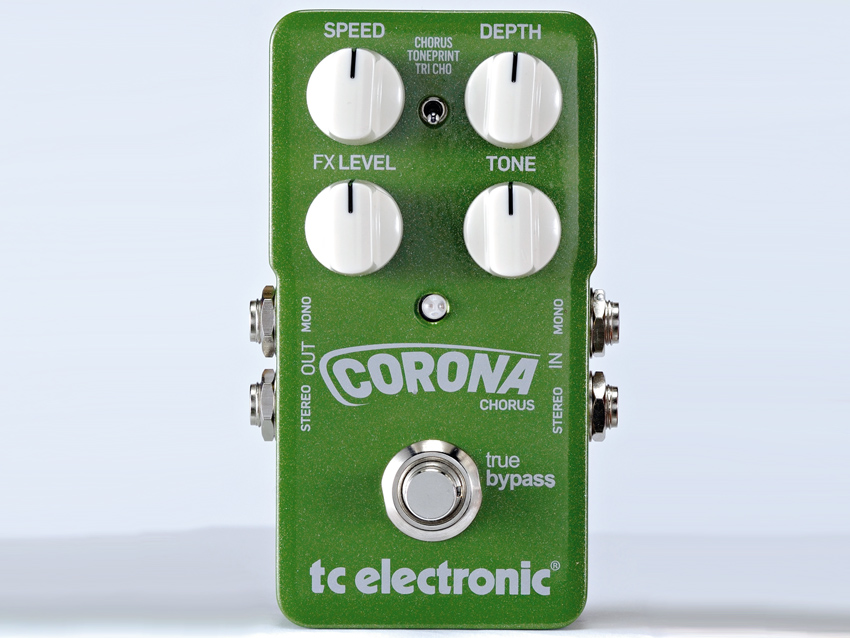MusicRadar Verdict
Two very different takes on the chorus effect in a single pedal.
Pros
- +
TonePrint. Two distinct chorus flavours. Subtle blends.
Cons
- -
Not much.
MusicRadar's got your back

TC Electronic Corona

Corona close-up
Denmark's TC Electronic is an effects legend. The last few years have seen the brand branching out into an innovative range of floor- and pedal-based products, including the genre-changing PolyTune pedal tuner and the successful Nova series stompboxes.
The Novas can be quite complex in operation, however, with scrolling memories, double footswitches, 12V power and so on, so the company has now launched a new range of pedals that are very much the opposite.
"If you like clear-as-a-bell sounds, the Corona won't disappoint."
Here we're talking straight-up, simple stompboxes. You get a compact digital pedal that can run from a 9V battery or DC adaptor. Battery access is by removing the pedal baseplate via a large chromed knurled screw that needs a coin or screwdriver to initially loosen it.
Inside, there's a pair of DIP switches - one that selects a high quality buffer rather than the default true bypass switching mode (which is useful if the pedal is at the start or end of a long chain) and a second that offersdry kill for effect only, when the pedal is to be used in an amp's FX loop.
The default setting is for analogue dry through signal, where the dry part of the signal isn't converted and passes through the pedal at all times, even when the effect is active.
Build
The pedal has four knobs, plus a three-way switch, and features selectable effects variations.
In designing the pedal, TC wanted something that was fast, easy and intuitive to use, with the ability to change sounds on the fly with a few knob tweaks.
Want all the hottest music and gear news, reviews, deals, features and more, direct to your inbox? Sign up here.
However, it was also aware that most stompboxes have a core sound - a basic tonality that's purely their own. Something that's fine if you like it, but that you're also unable to change if you grow tired of it. With this in mind, it set about building in a feature to allow access to a number of alternative sounds.
This feature is called TonePrint: the pedal has a USB connection that allows you to import a new sound, a custom 'tuning' of the pedal, from a computer and store it in a special onboard memory slot called up by the TonePrint position of the pedal's three-way switch (or the rotary switch in the case of the delay).
TC has made a number of these alternative 'tunings' available for each pedal, all easily accessed and downloaded into it from a special TonePrint website. And these aren't just voicings created by some Scandinavian boffin in a white lab coat. Instead, TC has asked a bunch of the world's best guitar players to make TonePrints for the pedals.
The company has given them a specially developed tuning software that allows them to tweak every single aspect of the pedals - parameter settings, what range the pots should have, what the min-mid-max values should be, and so on, to make their own perfect pedal.
Besides its TonePrint sound, the Corona delivers a standard chorus effect inspired by the vintage TC Stereo Chorus Flanger plus a Tri Chorus, a variation of the regular chorus that uses three stereo choruses with various offsets for both depth, speed, phase and chorus delay time to produce what TC describes as a unique, very broad and lush chorus.
Sounds
If you like clear-as-a-bell chorus pedal sounds, the Corona won't disappoint but, for a different chorus flavour, the Tri Chorus offers a more complex sound that's denser and more static than the standard setting.
Both sound good in normal use, but also offer plenty of scope for recording a big stereo sound using both outputs. And if it's subtlety you want, the FX level knob lets you add just a tickle of chorus to your dry sound.
This is an excellent pedal, and is sensibly priced. It would be very good value even without the TonePrint feature, but it's this that really sets it apart from the herd. TC has brought something to the table that other compact pedals don't have - effectively, this pedal is updatable.
The TonePrint sounds that came straight out of the box offer a useful and nicely programmed variation on the named effect but, as at the time of testing the TonePrint website wasn't live, we weren't able to try out any of the signature sounds.
Nevertheless we're pretty sure that the likes of Jeff Beck and Steve Vai aren't going to put their names to something that sounds less-than-good, so we expect there will be some cool sounds coming down the road.
As long as TC can keep up a constant stream of artists willing to share their sounds, you'll always have something new to try out.
Trevor Curwen has played guitar for several decades – he's also mimed it on the UK's Top of the Pops. Much of his working life, though, has been spent behind the mixing desk, during which time he has built up a solid collection of the guitars, amps and pedals needed to cover just about any studio session. He writes pedal reviews for Guitarist and has contributed to Total Guitar, MusicRadar and Future Music among others.
